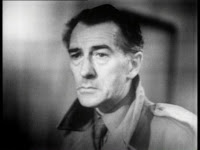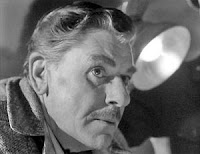
In the summer of 1953, a six-part series called "The Quatermass Experiment" was broadcast on the BBC between July 18th and August 22nd. It was the first science-fiction themed program aimed at an adult audience. Conceived and written by Nigel Kneale and starring Reginald Tate in the title role, "Experiment" told the story of the first manned flight into space, overseen by Professor Bernard Quatermass of the British Experimental Rocket Group. When the spaceship that carried the first successful crew returns to Earth, two of the three astronauts are missing, and the third is behaving strangely. It becomes clear that an alien presence entered the ship during its flight, and Quatermass and his associates must prevent the alien from destroying the world.

The unexpected success of "The Quatermass Experiment" led to the production of a second set of six episodes in the autumn of 1955. Nigel Kneale aptly named this series, "Quatermass 2," and it replaced Reginald Tate, who had passed away, with John Robinson. The serial sees Professor Bernard Quatermass being asked to examine strange meteorite showers. His investigations lead to his uncovering a conspiracy involving alien infiltration at the highest levels of the British Government. As even some of Quatermass's closest colleagues fall victim to the alien influence, he is forced to use his own unsafe rocket prototype, which recently caused a nuclear disaster at an Australian testing range, to prevent the aliens from taking over mankind. This serial is often credited with inspiring, among other things, "Invasion of the Body Snatchers," and praised for its allegorical concerns of the damaging effects of industrialisation and the corruption of governments by big business.

The final Quatermass serial, "Quatermass and the Pit," was broadcast between December and January 1958-1959. Again, the lead character was recast, this time with Andre Morrell. The series continues the loose chronology of the Quatermass adventures, and begins with Professor Bernard Quatermass being forced out of his role at the British Experimental Rocket Group, with the organisation being passed into military control by the British Government. Quatermass and his new colleague, Colonel Breen, become involved in the discovery of a bizarre object at an archaeological dig in Knightsbridge, London. As the serial progresses, Quatermass and his associates find that the contents of the object have a horrific influence over many of those who come into contact with it. As this influence increases, affecting Quatermass himself, darker implications are revealed about the entire nature and origins of mankind. This serial was voted one of the top 100 British Television Programmes by the British Film Institute and has been cited as an influence by both Stephen King and John Carpenter.

So great. These sound amazing, but they aren't available in the States. What's a guy like me to do? Luckily, my old pals at Hammer Films decided to adapt these into films. Bad news, these films are also not available in the United States. They are, however, definitely available via bootlegs purchased on ebay. For a measly $15, I got all three. The first two on one disc and third on another one. Before I popped them in, I wanted to know what I was getting myself into.

Around the time "Quatermass 2" was being produced for the Beeb, Hammer Films were in the process of turning the first serial into a film. Directed by Val Guest, "The Quatermass Xperiment" was co-written by Guest and Richard Landau. The title was a reference to the fact that the film was given an X certificate in the UK. As the film would be a United States co-production, it was decided that a known American actor be brought in to play the story's lead. They decided upon tough guy actor Brian Donlevy who'd earned an Oscar nomination for Beau Geste in 1939 but was otherwise known for westerns or light comedy. Not exactly the kind of person you'd expect to play a brilliant rocket scientist. The character's creator, Nigel Kneale agreed, quoted as saying, "Donlevy played him as a mechanic, a creature with a completely closed mind."

Despite the writer's misgivings, the film was successful enough to warrant adapting "Quatermass 2" to "Quatermass II" in 1957. This time, Kneale himself co-wrote the script with returning director Val Guest, though Donlevy also returned, making him the only actor to play the role twice. The third film didn't come around until 1967, directed by Hammer contract director Roy Ward Baker with a script entirely written by Kneale, unsurprisingly extremely close to his original television version, with whole scenes and chunks of dialogue remaining essentially untouched. Replacing Brian Donlevy as Quatermass was Scottish actor Andrew Keir. In contrast to Donlevy, Keir's performance as Quatermass has been very well-received down the years, and the film is generally felt to be the most faithful of the three cinematic adaptations, although it was not as commercially successful as its predecessors.

So this morning, I embarked on my own Quatermass Experiment, watching all three films back to back. Easy to do since they're only about 85 minutes a piece. The first film was not my favorite. Despite the cool beginning with the rocket crashing, the middle bit slows down quite a lot as Quatermass and his colleague, Dr. Briscoe, do a lot of experimenting. Brian Donlevy by and large does not fit the role as I understand it. Half the time he's like a cop, the other half he's whining. Still the movie's all right and has a good ending.

"Quatermass II" is a much better film, which I'm sure has something to do with having over double the budget of "Xperiment." There's much more scope and the story is more interesting. It ends with a kind of quasi-zombie showdown between townsfolk and alien-infected military in a natural gas plant. The downside to this one is that Brian Donlevy's performance actually is weaker than he was previously. I've read he only took part in these movies for the paycheck and it really shows. Still, the story and direction make up for him in a lot of ways.

The third film is superior in almost every way. First, it's in color, and while I love black & white, there's something about the way Hammer movies looked in the mid-60s that just makes me happy. Second, the story is absolutely phenomenal, regarding ancient alien locusts who may be behind the way humans developed. Nigel Kneale's script is taut, interesting, and at times quite frightening. Thirdly, and most importantly, Andrew Keir as Professor Quatermass is exactly the way he should be. Steadfast and strong, with a little bit of the sense of wonder that any man of the future should have. And it also didn't hurt that the transfer on this bootleg was infinitely better than the first two. "The Quatermass Xperiment" was taped off of Turner Classic Movies and transferred to disc, evident by the TCM logo that would appear in the lower right corner every so often.
If you get a chance to watch any of these films, please take it. These are some of the most involving, innovative stories of aliens from outer space I've ever seen. Until the day we can watch the television serials here in this country, these bootlegs will have to be sufficient to understand the legacy of Quatermass. As a character, he represents all that is possible in science, always looking ahead to the next big discovery. Much the same way I will continue my search for great, overlooked gems in the realm of British sci-fi and horror and tell you more than you ever thought you'd want to know.
You're welcome.
-Kanderson



These films, and their originals, are definitely worth watching - but only because the work of Nigel Kneale is in need of a drastic reappraisal: http://bit.ly/akw11W
ReplyDelete